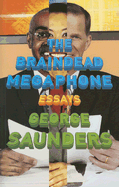
 Having established his reputation as an author of wildly original short fiction, George Saunders will delight his admirers and likely win new fans with his first nonfiction effort, The Braindead Megaphone. This collection of essays runs the gamut from political commentary to travel writing to literary criticism, and while a few of the pieces fall short of the collection's overall standard of excellence, it's a consistently engaging work that showcases the talent of a writer who someday may be as influential as one of his literary role models, Kurt Vonnegut.
Having established his reputation as an author of wildly original short fiction, George Saunders will delight his admirers and likely win new fans with his first nonfiction effort, The Braindead Megaphone. This collection of essays runs the gamut from political commentary to travel writing to literary criticism, and while a few of the pieces fall short of the collection's overall standard of excellence, it's a consistently engaging work that showcases the talent of a writer who someday may be as influential as one of his literary role models, Kurt Vonnegut.Although The Braindead Megaphone is overtly political only episodically, in the title essay Saunders eloquently displays raw anger at the debased state of American mass media. Observing that "something latent in our news media became overt and catastrophic around the time of the O.J. Simpson trial," he draws a straight line from that breakdown to television's failure to challenge the propaganda campaign that paved the road to the invasion of Iraq. "What had gone dead was the curious part," he writes, "the part that should have been helping us decide about the morality and intelligence of invasion, that should have known that the war being discussed was a real war, that might actually happen, to real, currently living people."
In pieces about a trip to Dubai ("The New Mecca") and Nepal ("Buddha Boy"), Saunders demonstrates that he's an observant and skilled travel writer. The former essay showcases his wide-eyed wonder at the opulence of the capital city of the United Arab Emirates, home to the world's only seven-star hotel. The latter chronicles his trip to Nepal to see a 15-year-old boy who's reportedly been meditating without food or water for seven months. In it, he strikes a charming balance between skepticism and religious awe.
Saunders, a professor of creative writing at Syracuse, seems most relaxed in the several literary essays that are among the highlights of the collection. He pays homage to Esther Forbes, author of the children's novel, Johnny Tremain--which I'm old enough to recall merely as a mediocre Walt Disney movie from the 1950s--lauding her for teaching him that, "Poor prose can mark an attempt to evade responsibility." He offers equally generous tributes to Kurt Vonnegut's Slaughterhouse Five and Mark Twain's Huckleberry Finn, and his deconstruction of Donald Barthelme's short story "The School" sent me off immediately to my copy of 60 Stories to read it for myself.
In this space, it's possible to give only the briefest sense of the striking variety of essays in this collection. When I finished the book, I felt as if I'd spent a few hours in the company of a wise, witty, occasionally quirky and warmhearted companion, and just a little wistful at the thought that if there were more people like George Saunders among us, the world might well be a more decent and compassionate place.--Harvey Freedenberg

